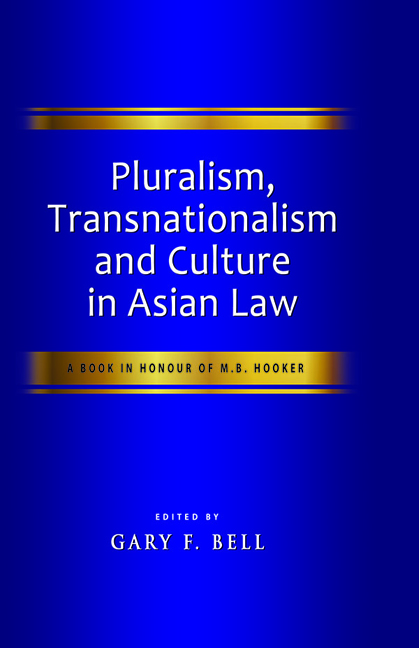Book contents
- Frontmatter
- Dedication
- Contents
- Preface
- Acknowledgements
- About the Contributors
- Chapter 1 M.B. Hooker and Southeast Asian Law: Path-breaking Passions
- Chapter 2 Asian Thought and Legal Diversity
- Chapter 3 Comparative Law, Anti-Essentialism and Intersectionality: Reflections from Southeast Asia in Search of an Elusive Balance
- Chapter 4 Legal Pluralism and Legal Anthropology: Experiences from Indonesia
- Chapter 5 Mapping the Relationship of Competing Legal Traditions in the Era of Transnationalism in Indonesia
- Chapter 6 Indonesia's Weak State Courts and Weak Law Fare Poorly in a Pluralist Commercial World
- Chapter 7 When Laws Are Not Enough: Ethics, Aesthetics, and Intra-Religious Pluralism in Contemporary Indonesia
- Chapter 8 Legal Pluralism and the Constitutional Position of East Malaysia's Indigenous Peoples: The View from the Longhouse
- Chapter 9 Sharia, State and Legal Pluralism in Indonesia: How Law Can You Go?
- Chapter 10 Negotiating Legal Pluralism in Court: Fatwa and the Crime of Blasphemy in Indonesia
- Chapter 11 Islamic Law in Israel: A Case Study in Legal Pluralism
- Chapter 12 The Road to Democracy Goes Through Religious Pluralism: The Indonesian Case and Thoughts on Post-Mubarak Egypt
Chapter 9 - Sharia, State and Legal Pluralism in Indonesia: How Law Can You Go?
Published online by Cambridge University Press: 12 January 2018
- Frontmatter
- Dedication
- Contents
- Preface
- Acknowledgements
- About the Contributors
- Chapter 1 M.B. Hooker and Southeast Asian Law: Path-breaking Passions
- Chapter 2 Asian Thought and Legal Diversity
- Chapter 3 Comparative Law, Anti-Essentialism and Intersectionality: Reflections from Southeast Asia in Search of an Elusive Balance
- Chapter 4 Legal Pluralism and Legal Anthropology: Experiences from Indonesia
- Chapter 5 Mapping the Relationship of Competing Legal Traditions in the Era of Transnationalism in Indonesia
- Chapter 6 Indonesia's Weak State Courts and Weak Law Fare Poorly in a Pluralist Commercial World
- Chapter 7 When Laws Are Not Enough: Ethics, Aesthetics, and Intra-Religious Pluralism in Contemporary Indonesia
- Chapter 8 Legal Pluralism and the Constitutional Position of East Malaysia's Indigenous Peoples: The View from the Longhouse
- Chapter 9 Sharia, State and Legal Pluralism in Indonesia: How Law Can You Go?
- Chapter 10 Negotiating Legal Pluralism in Court: Fatwa and the Crime of Blasphemy in Indonesia
- Chapter 11 Islamic Law in Israel: A Case Study in Legal Pluralism
- Chapter 12 The Road to Democracy Goes Through Religious Pluralism: The Indonesian Case and Thoughts on Post-Mubarak Egypt
Summary
M.B. Hooker has produced at least two important books on Islamic law in Indonesia: Indonesian Islam: Social Change through Contemporary Fatawa (2003) and Indonesian Syariah: Defining a National School of Islamic Law (2008). The two books demonstrate how Islam and sharia in Indonesia are understood and practised in a different way compared with the Middle East and other regions. Hooker offers his critical reviews of the method and application of fatwas, along with his evaluation of many different public faces of sharia from tertiary curricula, the Friday sermon in mosques, and a bureaucratic form of conducting the hajj, to the debates on public morality. Hooker's books show how elusive is the meaning of sharia in contemporary Indonesia.
My chapter considers some of Hooker's findings and focuses on how the issue of sharia is placed in the context of Indonesian law reform. As Hooker observed, until the early 1990s, “the status of Syariah in the Indonesian legal system was much as the Dutch had left it”. But things changed after the Soeharto era. The topic of sharia and pluralism in Indonesia is a complex arrangement of legal and public reasoning, moral practice, and political authority. There is understandable anxiety about the role of religion in public life, and Indonesian society's attempts to inculcate the values of respect, tolerance and pluralism. The main question is: Does legal pluralism still have a place in Indonesian Islam? My chapter examines the Indonesian experience as a vehicle to answer these questions. Among other things, I argue that Indonesia should be seen as a laboratory for legal pluralism, where state law coexists with sharia in legal postulates, official and unofficial laws.
Law Reform
The issue here is the unfinished discussion on religion, state and pluralism after the Soeharto era: how a state should, at the same time, accommodate and restrict the emergence of sharia into public life? If a state law was proposed and inspired by a particular rule from a particular religion, through public reasoning, would this situation damage the principle of state neutrality? Law and religion are entwined in the constitutional foundations of nations.
- Type
- Chapter
- Information
- Pluralism, Transnationalism and Culture in Asian LawA Book in Honour of M.B. Hooker, pp. 208 - 230Publisher: ISEAS–Yusof Ishak InstitutePrint publication year: 2017

